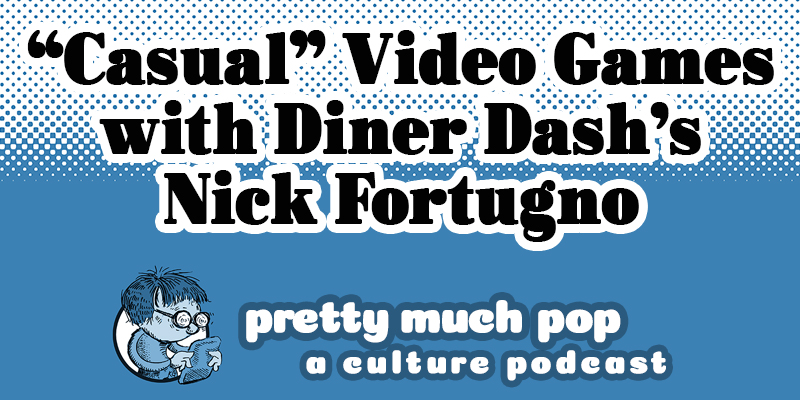What Is a “Casual Game?” Pretty Much Pop: A Culture Podcast #46 Talks to Nick Fortugno, Creator of “Diner Dash”

Famed game designer Nick joins your hosts Mark Linsenmayer, Erica Spyres, and Brian Hirt to consider fundamental questions about the activity of gaming (Nick calls games "arbitrary limits on meaningless goals") and what constitutes a casual game: Is it one that's easy (maybe not easy to win, but at least you don't die), one meant to be played in short bursts, or maybe one with a certain kind of art style, or just about any game that runs on a phone? Nick's most famous creation is the casual Diner Dash, which can be very stressful. Vastly different games from very hard but very short action games and very involved but soothing strategy games get lumped under this one label.
Our conversation touches on everything from crosswords to Super Meat Boy, plus the relation between psychology and game design, whether casual games really play less than hardcore gamers, the stigma of an activity that was for marketing reasons at one point branded as being just for adolescent boys, and even heuristics for beating slot machines.
Some sources we looked at include:
- Wikipedia on casual games
- "Casual Games, Time Management, and the Work of Affect" by Aubrey Anable
- "Hyper Casual Game: Mobile Gaming’s Newest Genre" by Matija Hanicar
- "The Rise of Casual Gaming" by Niraj Chokshi
- "Popcap: The 10 Secrets of Casual Game Design" by Keith Stuart
- "Gaming Conceptz: Casual Games for Casual Players" by Vince Vader
- Casual Game Insider Magazine
Just so you don't have to write them down, our recommendations at the end were:
- Nick: Candy Box!, Dicey Dungeons, Codenames, Super Hexagon
- Erica: A Fisherman's Tale
- Brian: Two Dots
- Mark: Feeding Frenzy (which is different from Insaniquarium where fish poop coins that Nick I think is referring to)
You can follow Nick @nickfortugno.
Learn more at prettymuchpop.com. This episode includes bonus discussion that you can only hear by supporting the podcast at patreon.com/prettymuchpop. This podcast is part of the Partially Examined Life podcast network.
Pretty Much Pop: A Culture Podcast is the first podcast curated by Open Culture. Browse all Pretty Much Pop posts or start with the first episode.
What Is a “Casual Game?” Pretty Much Pop: A Culture Podcast #46 Talks to Nick Fortugno, Creator of “Diner Dash” is a post from: Open Culture. Follow us on Facebook, Twitter, and Google Plus, or get our Daily Email. And don't miss our big collections of Free Online Courses, Free Online Movies, Free eBooks, Free Audio Books, Free Foreign Language Lessons, and MOOCs.
from Open Culture https://ift.tt/376Onjb
via Ilumina
Comments
Post a Comment